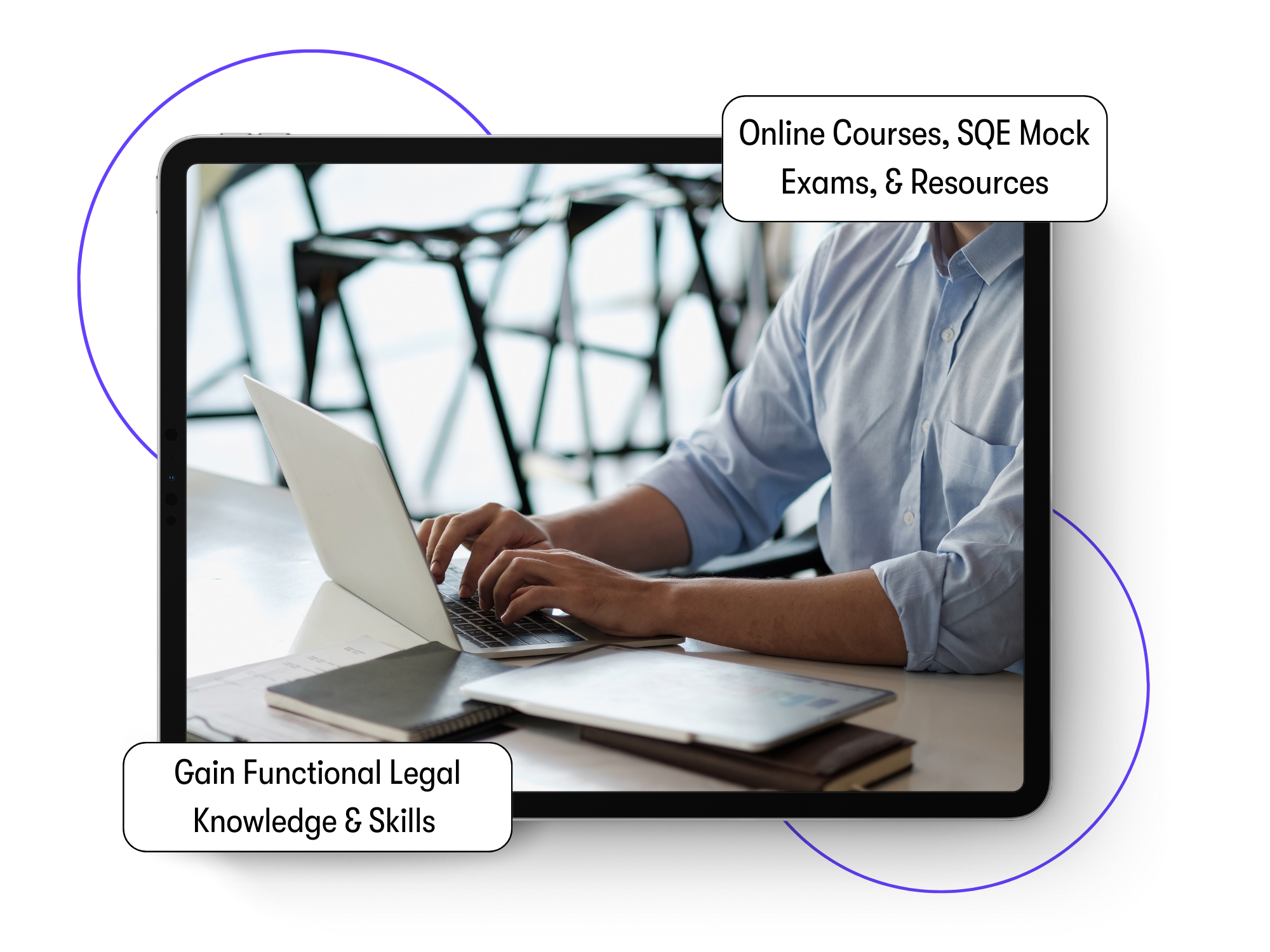Solicitors Qualifying Examination (SQE)
Learn the essential information about the SQE 1 and SQE 2. Including assessments, Qualifying Work Experience (QWE), and more.


Solicitor Qualifying Exam (SQE)
For those aspiring to become solicitors, the Solicitors Qualifying Exam (SQE) is the primary pathway into the legal profession. Introduced in 2021, it has began to replace the Law Practice Course (LPC). The SQE serves as the main route for both law graduates and non-law graduates aiming to become qualified solicitors. The Solicitors Regulation Authority (SRA) oversees the administration of the exam.
The SQE comprises two main assessments, SQE1 and SQE2, along with a two-year requirement known as Qualified Work Experience (QWE), which assesses your legal knowledge and skills. While QWE can be completed at any time, the only scheduling requirement is that you must take SQE1 before SQE2.
Upon successfully completing your QWE and passing all SQE assessments, you will be recognised as a qualified solicitor.


Private Route: Datalaw SQE1 Prep Course
At Datalaw, we have the SQE1 Preparation Course, designed for those seeking to enhance their functional legal knowledge and skills via the Solicitor Qualifying exam (SQE) route.
Our comprehensive SQE course equips both law and non-law graduates for a successful career as solicitors and to achieve excellence in the SQE exams. With our SQE preparation course, you’ll gain a thorough understanding of essential legal skills, ensuring confidence for passing the SQE exam and to thrive in your legal career.
Funded Route: Datalaw’s SQE Apprenticeships
Datalaw offers government-funded legal apprenticeships to support career development in the legal sector. Our Graduate Solicitor Apprenticeship is a 30-month Level 7 program for law graduates, combining work-based learning with preparation for the SQE. Please note: from January 2026, funding eligibility will be limited to those aged 16–21 at the start of the apprenticeship.
We also offer the Advanced Paralegal Apprenticeship, ideal for those seeking to build a legal career without a law degree, focusing on practical legal skills and independent legal support. Both programmes are largely government-funded, with minimal employer contribution.
- Graduate Solicitor Apprenticeship (Funding Changes January 2026)
- Advanced Paralegal Apprenticeship (SQE & CILEX Routes)


Everything You Need to Know About the SQE
SQE1 comprises two tests that assess functional legal knowledge: FLK1 and FLK2.
Each test includes 180 questions and is administered on separate days. Each day is split into two sessions, with 90 questions to be completed per session, each lasting approximately two and a half hours. There is a one-hour break between the two sessions.
You will need to schedule both parts of SQE2 simultaneously, as it includes both a written assessment and an oral skills evaluation, focusing on the application of functional legal knowledge.
Oral Assessments
The oral exams are held in Cardiff, London, and Manchester, each lasting for a half-day and spread over two days. These exams test your client-interviewing abilities and practical skills, including note-taking.
Written Assessments
Over a three-day testing period, there are four written tests each day, divided into two sessions per day.
Discover more about our Level 7 Solicitor Apprenticeship and Graduate Solicitor Apprenticeship, which include funding for the Solicitor Qualifying Exams & Prep Courses.
Before candidates for the Solicitors Qualifying Exam can be admitted as solicitors in England and Wales, they must complete the Qualified Work Experience (QWE) requirement. This involves two years of work experience, which can be accumulated at up to four different organisations. The work experience, supervised by a solicitor qualified in England or Wales, is designed to help aspiring solicitors develop the competencies outlined by the Solicitors Regulation Authority (SRA).
Apprenticeship Funding
The Department of Education has allocated funding to train thousands of professionals in work to gain further occupational qualifications. The Department of Education provides 95% of the funding and your practice pays only 5%. As an approved registered government training provider Datalaw can take advantage of this funding on your firm’s behalf to provide law apprenticeships.
To find out more information about funding routes and eligibility please register your interest below:
The Department of Education, funds education and skills training for children, young people, and adults. Established in 2017, it distributes funds to schools, colleges, and other institutions, manages apprenticeships, and ensures value for money in education. The Department of Education works to develop a skilled workforce and improve educational outcomes nationwide.
- Level 3 Paralegal Apprenticeship
- Advanced Paralegal Apprenticeship (SQE & CILEX)
- Level 4 Conveyancing Technician Apprenticeship
- Level 6 Licensed Conveyancer Apprenticeship
- Graduate Solicitor Apprenticeship
- Data Protection Officer Apprenticeship
- Chartered Legal Executive Apprenticeship
- Multi-Channel Marketer Apprenticeship
The Apprenticeship Levy is a UK government initiative introduced in April 2017 to fund apprenticeship programs. It requires companies with an annual payroll of over £3 million to contribute 0.5% of their total payroll to the levy. These funds are then available to the company as digital vouchers to pay for apprenticeship training and assessment. The aim is to increase investment in training, improve skills across the workforce, and encourage businesses to create more apprenticeship opportunities.
Smaller companies can also benefit from government co-funding for apprenticeships, even if they do not pay the levy. Non Levy paying employers receive 95% funding from the Department of Education for apprenticeships. The employer just pays 5% of the full cost.